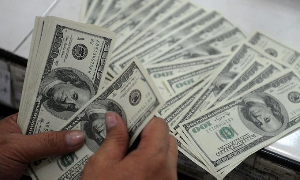The International Monetary Fund (IMF) has revealed that the Bank of Ghana (BoG) injected up to $1.4 billion as foreign exchange (FX) intervention into the market in the first quarter of 2025.
According to the Fund, the BoG’s presence in the market increased significantly in 2025, attributing this to the steady appreciation of the local currency, the cedi.
The IMF also noted that Ghana recorded an estimated surplus of 1.1 percent of GDP in 2024, benefiting from much stronger-than-anticipated gold exports and remittances.
In its Country Report on the Fourth Review of Ghana’s programme, the IMF stated, “The BoG’s footprint in the FX market continued to increase, with inflows reaching US$11 billion (up 42 percent from 2023) and FX sales (FXI) tripling to US$3 billion in 2024 (including US$2 billion in Q4).
“Large-scale FXI continued in 2025, reaching US$1.4 billion in Q1. The strong external sector, along with repeated FXI, contributed to a 60 percent nominal exchange rate appreciation against the US dollar between November 2024 and May 2025.”
The Fund highlighted that Ghana has benefited from rising gold prices and increasing remittances, which have significantly boosted the country’s reserves.
“Concurrently, net private sector outflows were higher. It recorded an estimated surplus of 1.1 percent of GDP last year, benefiting from much stronger than anticipated gold exports and remittances. Concurrently, net private sector outflows were higher in December 2024 and US$7.6 billion at end-March 2025 (3 months of prospective imports),” the report noted.
However, the IMF cautioned the BoG against excessive intervention in the forex market and advised maintaining a tight monetary policy until inflation is fully under control.
“The authorities have made significant strides toward rebuilding international reserves and taken steps to bring inflation down. The Bank of Ghana should maintain an appropriately tight monetary stance until inflation returns to its target, reduce its footprint in the foreign exchange market, and allow for greater exchange rate flexibility, including by adopting a formal internal FX intervention policy framework,” it said.
The IMF also attributed a portion of the FX inflows to the BoG’s domestic gold purchase programme.
“This largely reflects the scaling up of domestic gold purchases, which grossed over US$3.6 billion in 2024 and accounted for almost a third of the Bank of Ghana’s (BoG) FX inflows, in addition to the revaluation of physical gold reserves (over US$500 million),” the report added.
The Ghanaian cedi appreciated significantly in the first quarter of 2025, strengthening from GH¢16 to GH¢10.40 against the US dollar on the interbank foreign exchange market.
This appreciation has contributed to a decline in inflation and is expected to prompt a reduction in the monetary policy rate in the coming quarters.
SSD/MA
Cheque Fraud EXPOSED: How it works and how to stay safe
GhanaWeb Special: The gold market that fuels galamsey

